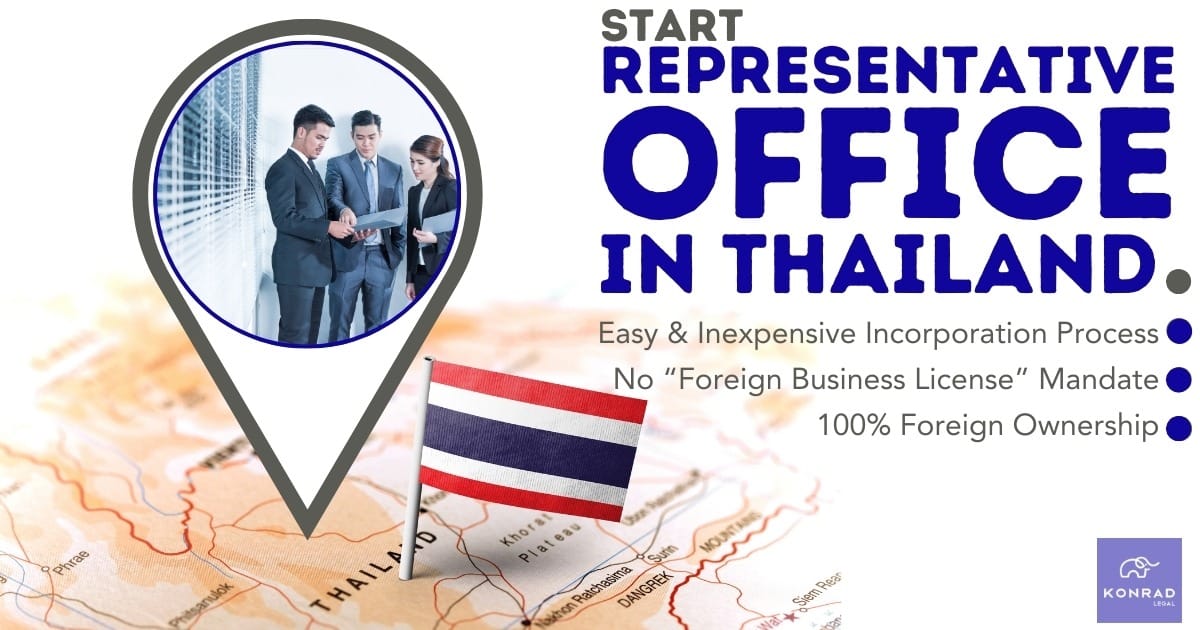A Representative office in Thailand, as the title suggests, is not an independent entity but rather an extension of foreign businesses operating in Thailand. They are distinct from independent companies in that they lack shareholders, meaning there are no foreign ownership restrictions.
However, a fundamental limitation of representative offices is their inability to generate revenue locally. In essence, their activities are limited to spending resources within Thailand without the ability to earn income.
What is a Representative Office in Thailand?
Establishing a representative office (RO) is an optimal option for foreign investors exploring the Thai market. ROs can be fully foreign-owned and can employ up to two foreign workers with work permits. Notably, ROs are not permitted to generate income while operating in Thailand and are thus exempt from corporate income tax. The scope of RO activities is limited to market research, partnership exploration, and other forms of information gathering.
Does the functionality of a Representative Office in Thailand align with your business needs? If “Yes”, you must know about the advantages that you can get out of it!
Advantages of Representative Office in Thailand
- For foreign investors conducting business in Thailand, setting up a representative office (RO) is a straightforward process. The process is simpler than establishing a foreign-owned company. The RO allows for 100% foreign ownership. For this reason, it serves as a popular choice for foreign investors who are still exploring the Thai market. It facilitates the parent company’s exploration of new partnerships and opportunities.
- One key benefit of setting up a representative office (RO) is that it does not require a Foreign Business License (FBL) in Thailand. The FBL is governed by the Foreign Business Act, which limits foreign companies’ activities. Importantly, the RO is not permitted to generate income within Thailand.
- Compared to Thai limited companies, which must maintain a work permit ratio of four Thai employees for each foreign employee. Whereas, a Thai representative office has the advantage of reduced requirements for hiring foreign staff. The RO can issue work permits for up to two foreign employees without being subject to the same stringent ratio.
Depending on the type of business, there can be various other advantages, but these two are the most vital ones and apply to all types of companies.
Requirements to Start a Representative Office in Thailand
In contrast to private limited companies, representative offices need more revenue-generating capabilities and shareholders, resulting in fewer requirements for their establishment. For confirmation, you may check our article on Limited Company Registration for foreign investors in Thailand.
Nevertheless, certain requirements must be fulfilled to be eligible to start a representative office in Thailand:
- Permitted Activities: The representative office is limited to non-revenue-generating activities.
- Capital Requirements: Representative offices are required to have sufficient funds to finance their operations in Thailand. In practice, a company commits to transferring at least 2 million Thai baht (around US $ 55,000 at the time of writing) over 1-3 years depending on the planned activities.
- Thai Staff Employment: Representative offices must apply to at least one Thai national if they wish to employ foreign employees.
- Bank Account: The representative office must open a Thai bank account through which the remittance of foreign currency will be made.
- Office Space: The representative office must have a physical office space in Thailand from which it can conduct its permitted activities.
- Tax Obligations: While the representative office is prohibited from generating income, it still has to apply for a Thai tax ID and comply with tax reporting requirements.
Registration Process of a Representative Office in Thailand
The registration of a representative office requires approval from the Department of Business Development (DBD) under the Ministry of Commerce. The application includes:
- Details about the parent company;
- The activities of the representative office
- Evidence of capital remittance
On average, the registration of a representative office takes about 3-4 weeks.
Ideas of RO in Thailand that can help you!
You may always think of some different trade altogether. But, we are suggesting the types of businesses that are registered by us. Following are the types of businesses in Thailand that took our support to start their Representative Office in Thailand. Believe us, they are still performing brilliantly!
Finding suppliers in Thailand
Identifying Thai manufacturers who can deliver specific components like semiconductor chips or display panels that satisfy the technical and volume parameters of their head office.
Quality and quantity inspection
By adhering to overseas company standards, local textile producers can minimize return rates and boost customer contentment with their products.
Technical Advisory
At the head office, we provide technical guidance on using and maintaining medical devices to Thai distributors and customers, ensuring trust and reliability in our products.
Information Dissemination
To ensure a knowledgeable sales force and a successful market entry, the head office disseminated detailed information about new product features to Thai dealerships, creating a well-informed foundation for sales activities.
Market Intelligence Reporting
Through a thorough analysis of data about the Thai market’s receptiveness towards the company’s offerings, the head office was able to create and effectively launch a product line that aligned with local preferences, ensuring a successful introduction.
Professional corporate law firms in Thailand, like, Konrad Legal with a complimentary initial consultation can clarify the requirements and prerequisites for starting a representative office in Thailand. Certain activities not mentioned here could potentially result in income and corporate tax liabilities for which the head office is responsible, but the representative office might incur. Several other factors also contribute to the need for professional guidance.
To book your first consultation session, email us at officer@konradlegal.com.



